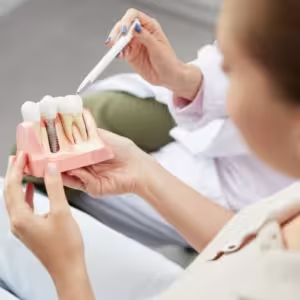
When considering dental implants, many patients at Dental 32 in Ashburn, VA, have questions about the procedure and what it entails. One common concern is whether bone grafting is necessary before receiving dental implants. This blog post aims to demystify bone grafting, explain its importance in the implant process, and help you understand if it might be necessary for your situation.
What Is Bone Grafting?
Bone grafting is a surgical procedure that involves the placement of bone tissue in areas where there is insufficient bone mass to support a dental implant. This can occur for various reasons, including tooth loss, periodontal disease, trauma, or developmental issues. The graft material can come from several sources:
- Autografts: Bone taken from another part of your body (e.g., hip or jaw).
- Allografts: Bone sourced from a deceased donor, which is processed and sterilized.
- Xenografts: Bone from an animal source, typically bovine, that is processed for safety.
- Alloplasts: Synthetic materials designed to promote bone growth.
Why Is Bone Grafting Necessary?
Bone grafting is not always necessary for every dental implant case, but there are several situations where it becomes essential:
1. Insufficient Bone Density
After losing a tooth, the underlying jawbone can begin to deteriorate due to lack of stimulation. Without a tooth root, the bone may lose its strength and volume, making it difficult to place a dental implant securely. Bone grafting helps restore the necessary density and volume.
2. Sinus Augmentation
For patients needing implants in the upper jaw, particularly the back molar area, there may not be enough bone height due to the proximity of the maxillary sinus. A sinus lift procedure, which is a form of bone grafting, elevates the sinus floor and adds bone to the upper jaw.
3. Complex Cases
Some patients may have experienced significant bone loss due to trauma or advanced periodontal disease. In such cases, bone grafting can provide a solid foundation for implants, enabling better long-term outcomes.
4. Preparing for Future Implants
In some instances, dentists may recommend bone grafting even if an implant isn’t placed immediately. This proactive approach can ensure there’s adequate bone for future implant placement.
The Bone Grafting Procedure
If Dr. Ninh determines that bone grafting is necessary for your dental implant, here’s what you can typically expect during the procedure:
Consultation and Imaging: Before any procedure, a thorough examination, including X-rays or 3D imaging, will be conducted to assess bone density and determine the extent of grafting needed.
Anesthesia: The area will be numbed using local anesthesia, and sedation options may also be available for those who are anxious.
Graft Placement: The graft material is placed in the area where bone is lacking. This can involve creating a small incision in the gum tissue to access the jawbone.
Healing Time: After the graft is placed, it will take several months for the bone to heal and integrate with the graft material. This healing process is crucial for the success of the dental implant.
Follow-Up: Regular follow-up appointments will be scheduled to monitor healing and ensure that the graft is integrating well with your existing bone.
Recovery and Aftercare
After bone grafting, proper care is essential for successful recovery. Here are some tips to aid in the healing process:
- Follow Post-Operative Instructions: Dr. Ninh will provide specific instructions tailored to your situation, including dietary restrictions and oral hygiene practices.
- Manage Pain and Swelling: Over-the-counter pain relief and ice packs can help minimize discomfort and swelling.
- Avoid Strenuous Activity: Refrain from heavy exercise or activities that may stress the surgical site for a few days following the procedure.
- Attend Follow-Up Appointments: Regular check-ups will help monitor your healing and ensure the graft is integrating well.
Is Bone Grafting Always Necessary?
Not every patient will require bone grafting before receiving dental implants. If you have sufficient bone density and volume, the implant can often be placed without additional procedures. Factors influencing the need for bone grafting include:
- Duration Since Tooth Loss: The longer the time since a tooth was lost, the greater the likelihood of bone resorption.
- Overall Oral Health: Conditions like periodontal disease can lead to bone loss, necessitating grafting.
- Anatomical Considerations: Individual anatomy, including sinus position and bone structure, can impact the need for grafting.
Consulting with Dr. Ninh
Ultimately, the best way to determine whether bone grafting is necessary for you is to schedule a consultation with Dr. Ninh at Dental 32. During your visit, Dr. Ninh will conduct a thorough examination, discuss your medical history, and utilize advanced imaging techniques to assess your bone structure.
Together, you’ll discuss your options and create a personalized treatment plan that meets your needs, whether that involves bone grafting or proceeding directly with dental implants.
Conclusion
Understanding bone grafting is an important part of the dental implant process. While it may be necessary for some patients to ensure successful implant placement, others may not require this additional procedure. By consulting with Dr. Ninh and exploring your options at Dental 32, you can make informed decisions about restoring your smile and oral health.
If you have questions about bone grafting or dental implants, don’t hesitate to reach out to our team. We’re here to guide you through every step of your dental journey!
FAQs
Non-covered benefits may not be deemed medically necessary by insurance providers but can still be essential for maintaining dental health.
If a procedure isn’t covered by insurance, it’s essential to discuss alternative payment options with your dentist and budget for the expense accordingly.
Regular dental check-ups are critical for preventive care, regardless of insurance coverage. Skipping them can lead to more significant dental issues in the future
Budgeting for dental expenses ensures that you can cover the costs of non-covered benefits and access necessary treatments when needed.
